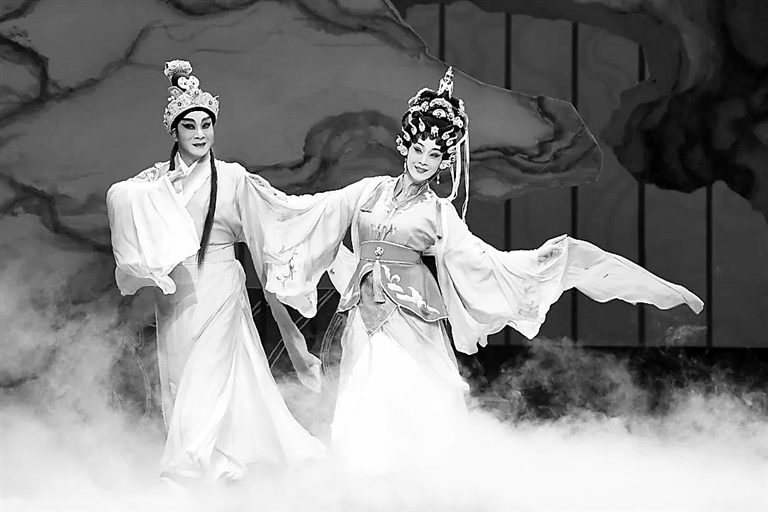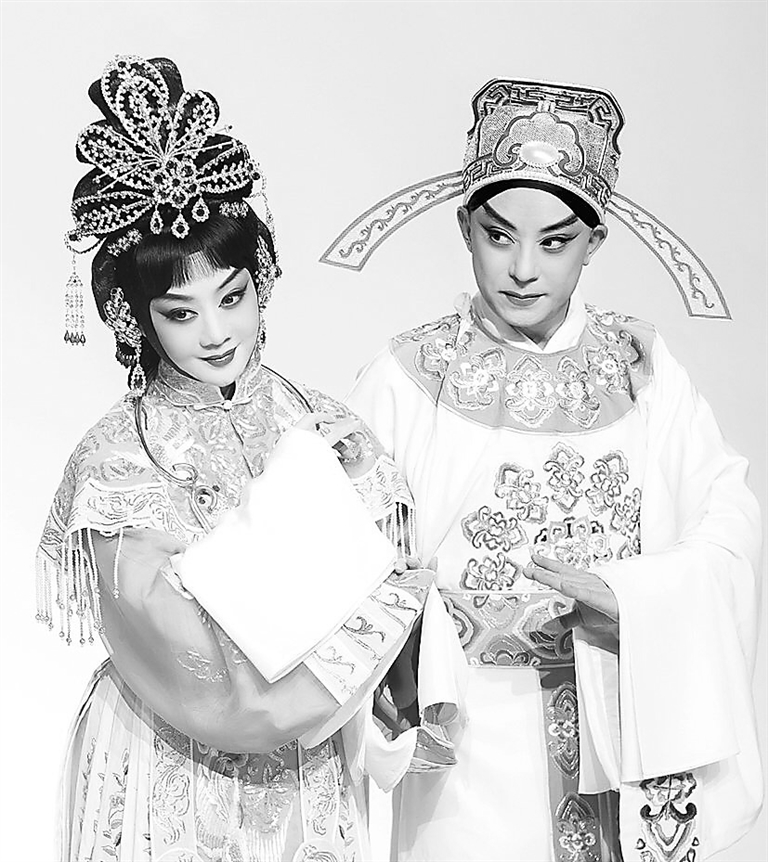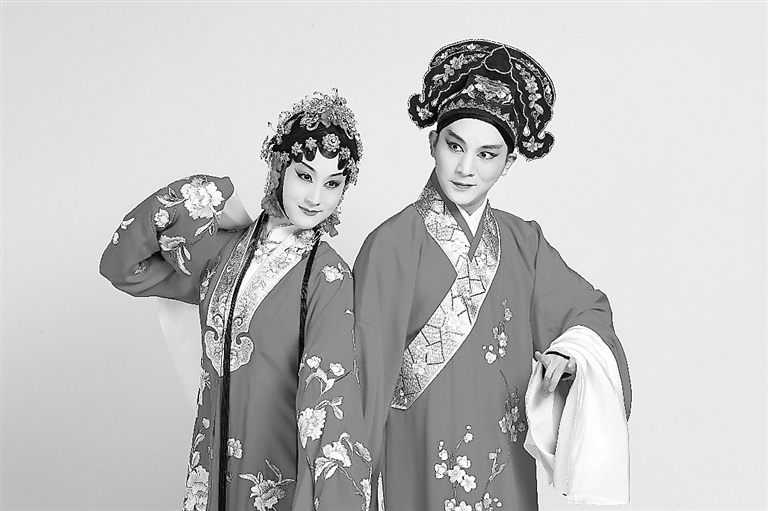


Kunqu opera Kunqu opera evolved from the local melody of Kunshan in Jiangsu Province, and subsequently came to dominate Chinese theater from the 16th to the 18th centuries. Kunqu has distinctive features in its musical performance. It is so mild, exquisite, sentimental and melodious. The libretto usually focuses on a story of romantic love. Kunqu singing emphasizes control of the voice and changes in rhythms. Singers must also use their skills to express the disposition of various characters, an aspect that adds complexity to the form. ‘The Peony Pavilion’ “The Peony Pavilion” was written by Tang Xianzu in the Ming Dynasty (1368-1644). It is the most popular Kunqu opera and all Kunqu troupes include it in their repertoire. The performance focuses on the love story between Du Liniang and Liu Mengmei. On a fine spring day, Du, the daughter of an official, takes a walk in the garden, where she falls asleep. In her dream she encounters a scholar, identified later in the play as Liu, whom in real life she has never met. Liu’s bold advances start off a flaming romance between the two and it flourishes rapidly. Du becomes preoccupied with her dream affair and her lovesickness quickly consumes her. Unable to recover from her fixation, Du wastes away and dies. The king of the underworld adjudicates that a marriage between Du and Liu is predestined and Du ought to return to the earthly world. Du appears in Liu’s dreams. He, now in the same garden where Du had her fatal dream, realizes that Du is the lady who appeared in his dreams. Liu then agrees to exhume her upon her request and Du is brought back to life. Liu visits Du’s family but he is imprisoned for being a grave robber and an impostor. The ending of the play follows the formula of many Chinese comedies. Liu narrowly escapes thanks to the arrival of the imperial examination results in which Liu has topped the list and thus the emperor pardons all. Time: 8 p.m., March 17 Tickets: 120-580 yuan ‘The Jade Hairpin’ “The Jade Hairpin” is a work of playwright Gao Lian in the Ming Dynasty. A tale of young love, this popular Kunqu romance is often used to measure the performance of the lead male and female roles. Ashamed to return home after failing the imperial exam, young scholar Pan takes refuge with his aunt, the head of a Taoist nunnery. There he falls for a pretty nun surnamed Chen who has entered the order after war left her family impoverished. When Pan’s aunt realizes the disgrace about to befall the nunnery, she sends Pan away to sit a second exam. Bidding a tearful farewell, the pair pledges to honor their love. Time: 8 p.m., March 18 Tickets: 120-580 yuan Venue: Shenzhen Poly Theater, Nanshan District (南山区深圳保利剧院) Metro: Line 2 or 11 to Houhai Station (后海站), Exit E Beijing opera Beijing opera combines music, vocal performance, mime, dance and acrobatics. From 1840 to 1860, it finally congealed as a mixture of elements of Qinqiang opera, Hanju opera, certain strengths of Kunqu opera, and local tunes of Beijing. The new form then began to create its own innovations. Compared with its earlier forms, melodies were simplified and played with traditional instruments. ‘Sword of the Universe’ and ‘The General Reconciles With the Prime Minister’ “Sword of the Universe” is a famous Beijing opera once played by master Mei Lanfang. Hu Hai, the second emperor of the Qin Dynasty (221-207 B.C.) is ruthless and tyrannical. He trusts the treacherous prime minister Zhao Gao, who steals the Sword of the Universe and frames his daughter’s father-in-law, Kuang Hong. The Kuang family members are all sentenced to death and Zhao’s daughter Yanrong returns home. One day, when Hu visits Zhao’s mansion, he finds Yanrong so beautiful that he wants to marry her. Zhao agrees in spite that his daughter is unwilling to marry Hu. A maid then suggests Yanrong to pretend to be mad and finally, Yanrong is released to return home. “The General Reconciles With the Prime Minister” is a well-known historical story in the Warring States (475-221 B.C.). Lin Xiangru is the prime minister of the State of Zhao and Lian Po, a general of the state, is jealous of him. Lian tries to humiliate Lin in several encounters but each time, Lin avoids conflict with him. When Lian learns of Lin’s efforts for the state, he regrets what he has done and ask for punishment in front of Lin. Time: 7:30 p.m., March 25 Tickets: 80-680 yuan ‘Silang Visits His Mother’ In a bloody battle at the frontier in the Northern Song Dynasty (960-1127), Yang Yanhui (also named Yang Silang), the fourth son of the Yang family, is taken alive by the enemies from Qidan Kingdom, and changes his name to disguise his real identity. The Empress Dowager Xiao (the ruler of Qidan) likes him very much, and forces him to marry Princess Tiejing of Qidan Kingdom. Fifteen years later, Yang learns the news that his mother is coming to the frontier with his brother. He misses her so much that he sneaks there with the help of his wife. At the bittersweet moment, they hug each other and cry with happy tears. Time: 7:30 p.m., March 26 Tickets: 80-680 yuan ‘The Emperor’s Daughter’ The Beijing opera “The Emperor’s Daughter” is adapted from the Cantonese opera of the same name. It relates to the love story between Princess Changping, the last princess of the Ming Dynasty, and her husband Zhou Shixian. The original Cantonese opera was written in 1957 by Hong Kong opera dramatist Tong Dik-sang. Time: 7:30 p.m., March 27 Tickets: 80-680 yuan Venue: Shenzhen Grand Theater, Luohu District (罗湖区深圳大剧院) Metro: Line 1 or 2 to Grand Theater Station (大剧院站), Exit B Cantonese opera Cantonese opera, originating in Guangdong Province, is one of the major categories in Chinese opera. It is popular in Guangdong, Guangxi, Hong Kong, Macao and among Chinese communities around the world. Like all versions of Chinese opera, it is a traditional Chinese art form, involving music, singing, martial arts, acrobatics and acting. ‘The Bridge of Magpies’ “The Bridge of Magpies” is adapted from the Chinese folk tale of the Cowherd and the Weaver Girl. Their love is not allowed, so they are banished to opposite sides of the heavenly river. Once a year, on the seventh day of the seventh lunar month, a flock of magpies would form a bridge to reunite the lovers for one day. The folk tale originated from people’s worship of natural celestial phenomena, and later developed into the Double Seventh Festival (also known as Chinese Valentine’s Day). Time: 7:30 p.m., March 25 Tickets: 10-30 yuan ‘The Jade Hairpin’ The Cantonese opera is adapted from the Kunqu opera of the same name. Time: 7:30 p.m., March 26 Tickets: 10-30 yuan Venue: Shenzhen Theater, Luohu District (罗湖区深圳戏院) Metro: Line 1 or 3 to Laojie Station (老街站), Exit F Huangmei opera Huangmei tone originated as a form of rural folk song and dance that has been in existence for the past 200 years and possibly longer. The original Huangmei opera was sung by women when they were picking tea leaves. In the late 19th century, the songs came into Anhui Province, were combined with the local folk art and with singing and chants in the Anqing dialect, and gradually developed into a form of opera. The music is performed with a pitch that hits high and stays high for the duration of the song. ‘Fairy Couple’ The opera tells the love story of the seventh daughter of the Emperor in Heaven and Dong Yong, an honest and kind-hearted man on earth. Time: 8 p.m., April 16 Tickets: 120-380 yuan ‘Thunderstorm’ This opera is adapted from modern writer Cao Yu’s stage play “Thunderstorm,” one of China’s most enduring 20th-century dramas. Revolving around two families whose complex relationships lead to inevitable tragic consequences unfolding against the backdrop of turmoil of the decade, the script, written in 1933, was critically praised both at home and abroad. Time: 8 p.m., April 17 Tickets: 120-280 yuan Venue: Pingshan Theater (坪山大剧院) Transport: Take the high-speed rail from Shenzhen North Station to Pingshan Station and then take a taxi(SD News) | 
